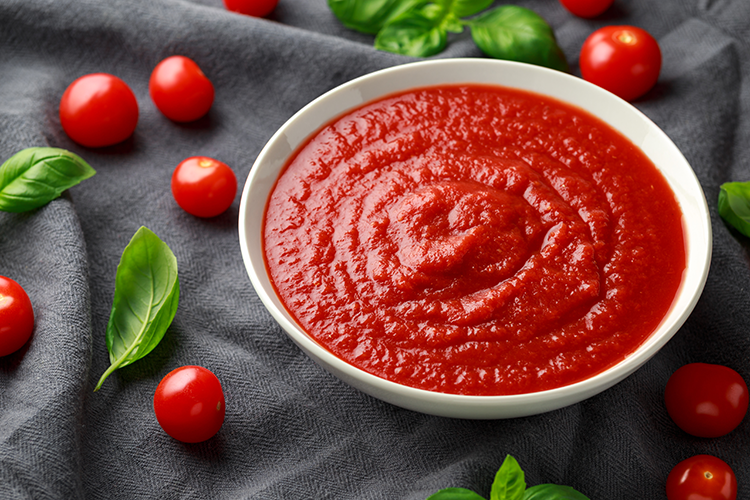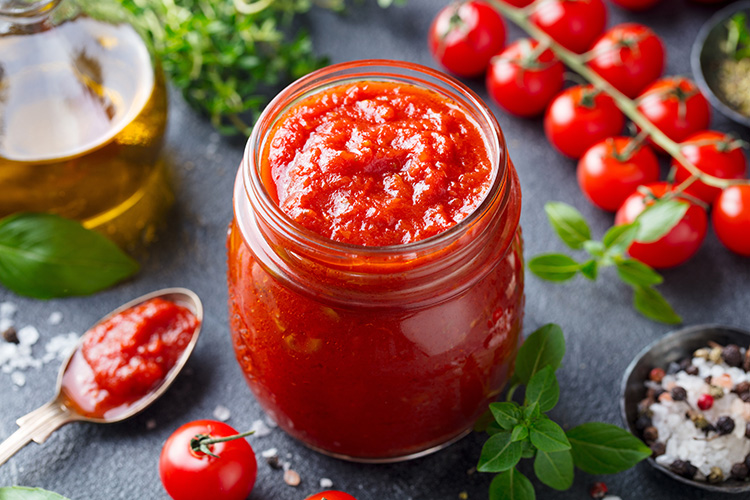The Secret Sauce: Tomato Paste Extender for Pizza Sauce
Pizza is an ideal delivery system full of vegetables, proteins and grains which are packed with fiber, vitamins and minerals. However, escalating tomato costs can hinder opportunities. The new Citri-Fi® 600 series is a neutral flavored citrus fiber that creates thick natural tomato-like textures. At low usage levels (1%), this tomato paste extender for pizza sauce can reduce usage by 25-30%.
Years ago, I attended a new product development course at the Annual IFT Expo. The instructor assigned groups to tackle one of New Orleans’s conundrums – lack of nutrition within the homeless community. To fully understand the communities’ needs, our group milled around the city on foot interviewing shelters, missions and other non-profit homeless organizations. We returned to our class with the ultimate idea - pizza. Pizza met the nutritional requirements to survive the streets. This ideal delivery system full of vegetables, proteins and grains was packed with fiber, vitamins and minerals. And the secret sauce – no pun intended – was the pizza sauce. However, every penny counted in this environment. As a result, we recommended several cost cutting solutions including tomato paste extenders for pizza sauce.
Tomato Paste Extender Solutions
Tomato paste extenders have existed for years in the food industry. For instance, these solutions range from starches and food gums to other stabilizers. Each solution bears their own pros and cons when used to extend tomato in pizza sauces. For example, food starches create hot or cold viscosity that builds texture when tomato solids are reduced. However, they typically require high usage levels and produce a different mouthfeel. Food gums, on the other hand, thicken up textures at low usage levels (<1%). Yet, their textures tend to be stringy.
Today, the market offers natural alternatives such as citrus fiber. However, not all citrus fibers are created equal. The NEW Citri-Fi 600 citrus fiber series provides the “next level of functionality”. This neutral flavored fiber provides higher viscosity versus the flagship 100 line. Other citrus fibers on the market contribute limited functionality including added viscosity. Because of this, Citri-Fi 600 serves as an ideal tomato paste extender for pizza sauce.
At low usage level (1%), Citri-Fi 600 reduces up to 25-30% tomato paste. As a result, manufacturers can witness significant cost savings. This natural citrus fiber requires only high shear, such as a countertop blender, to create a thick and natural tomato-like texture. To reduce higher levels of tomato paste, product developers can increase the Citri-Fi 600 usage level and/or increase shear by using a homogenizer. These methods can extend tomato paste up to 50%.
Citrus Fiber Portfolio of Tomato Paste Extenders
Now, product developers have several tomato extension solutions to choose from. Selecting the best solution depends on equipment and food labeling requirements. The Citri-Fi 100 citrus fiber series calls for high shear such as homogenization to provide similar benefits. The Citri-Fi 200 series, which is citrus fiber co-processed with guar gum, thickens too. However, the food labeling includes “guar gum” which can be a deal breaker for developers. And for organic food and beverages, the Citri-Fi 700, which is the USDA certified organic version of Citri-Fi 600, will be launched soon.
Other citrus fiber benefits include syneresis control, starch and gum-free formulations and food processing stability (low pH, heat and freeze/thaw). In addition to the functional benefits, Citri-Fi is non-allergenic, gluten-free and non-GMO. The 100 and 600 series have no E-numbers. Labeling options include citrus fiber, dried citrus pulp or citrus flour which resonate well in the natural and clean label markets.
The technical team is available to provide guidance in using Citri-Fi citrus fiber as a tomato paste extender in pizza sauce. Please contact us to learn more about potential cost savings.



